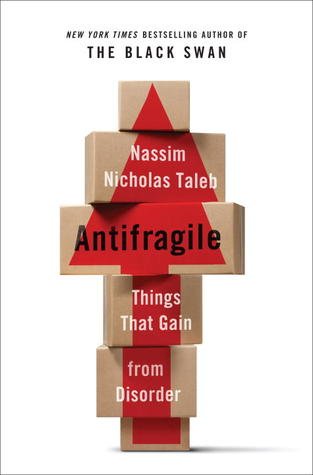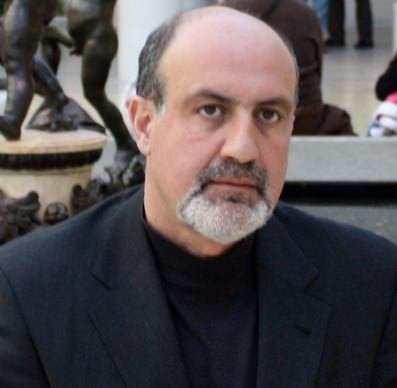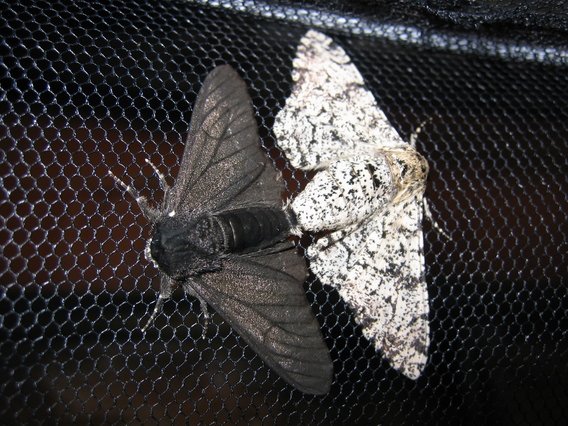Are you fragile, robust or maybe even… antifragile?

Hello guys! Here I am, with my first blog post, if you don’t count the one where I am introducing myself, of course :) Today I want to talk with you about book “Antifragile: Things That Gain from Disorder” by Nassim Nicholas Taleb. It's quite complex book, I had impression that it raises many ideas, not only idea of being “antifragile”. It’s quite hard to summarize what it's about, and maybe it’s not the best choice for first blog post, but I just finished reading it and really wanted to share my observations about it, mainly ones that can be inspirational for everyday lifes, while skipping more technical parts of the book. So… let’s begin!
Nassim Nicholas Taleb comes from Lebanon. He used to be a trader, now he is a statistician, risk analyst, and generally a person who is specialized in probability, randomness, uncertainty. His book “Antifragile” is no different, it's also about risk, randomness and especially how things, systems (or people) react to this randomness. It's a part of “Incerto” series that he is creating, which consists also of books like “The Black Swan: The Impact of the Highly Improbable” or “Fooled by Randomness: The Hidden Role of Chance in Life and in the Markets”. You may heard about his books, they are quite bestsellers. But today let’s focus on “Antifragile”.

Nassim Nicholas Taleb, author of this book, himself
So, what does it even mean, to be antifragile?
Wind extinguishes a candle and energizes fire.
Likewise with randomness, uncertainty, chaos: you want to use them, not hide from them. Some things are fragile—they don’t like chaos, while others are robust—they don’t care if things are crazy.
Antifragility is beyond resilience or robustness. Antifragile things get better and stronger when the world is falling apart. Everything that has more upside than downside from random events (or certain shocks) is antifragile; the reverse is fragile.
This is the quote from the book that summarizes nicely the idea of being antifragile. As you saw earlier, I used terms fragile, robust and antifragile. This is something that Nassim is calling “The Triad”. What is fragile? We all know. The glass is fragile, because sudden shock will break it, you are not throwing it as if it would be a pillow. Pillow… pillow is robust, because it sustains it’s shape and function even when throwed or dropped. Sudden shock doesn’t harm pillow, but also doesn’t help it. It just stays a pillow, it doesn’t care. But antifragile - antifragile things are getting better when under the stress, randomness, shocks. Glowsticks, the ones that you need to “break” to make them glow, may be called antifragile because bending/breaking them actually makes them work, while if you would keep them safe, they wouldn’t do anything. Shock from bending is good for glowstick since it's making it work. If you don't know what kind of glowstick I have in mind, here is a short random video that I found on YouTube and that is presenting how those work.

We all know this sticker that says that the content of the box is fragile. And we all would hate if the delivery man would throw the box with glasses that we ordered, or new PC
Another, more general example of antifragile is evolution, or generally life on earth, when considered as something that is thriving since billions of years - small errors, changes make it possible for life to adapt. Life is evolving, that is why it's adapting. It's not only robust, life is not hiding in some cave to protect itself from sun, water etc. It's evolving so it's better - we have fish that can swim, birds that are adjusted to climate in which they live. Peppered moth evolved to change colour to be black-bodied, because after the industrial revolution it was easier to hide from predators while being black, since industrial revolution polluted the air and buildings were dark from all the smog!

Here is an example of evolution. Peppered moth on the left is the one that evolved to be fit for polluted area, while the one on the left is peppered moth that comes from not polluted area, and thus not evolved
Nassim is using also example of Hydra from greek mythology. If you remember the myth, Hydra would grow another two or three heads in the place of the head that was cut-off. That is why it was antifragile to people that tried to kill it - it was benefiting from them, because Hydra was becoming stronger every time, not weaker.
Since we are here on steemit, the platform that is based on blockchain technology, I thought about another example of antifragile. Maybe some of you know, that bitcoin and other cryptocurrencies networks are prone to being overwhelmed by number of transactions, since transactions needs to be confirmed and big amount of them can lead to congestion and high fees. But there are also cryptocurrencies based on DAG technology, for example IOTA which uses “tangle”. In IOTA every transaction needs to also confirm two other transactions, so the higher the “traffic” in IOTA network, the faster transactions are confirmed (if I'm wrong, correct me). This is being antifragile, IOTA benefits from higher number of transactions, not like other blockchain cryptocurrencies, that may have treat high number of transactions as problem that is congesting the network. This is of course simplifying the idea, but you get the point.
In fact, I may be wrong, but I heard that right now IOTA developers are creating fake transactions to speed things up, because there is not enough real transactions. IOTA thus hates “stability”, just as all antifragile things.
What are the crucial points that we should get out of this idea of antifragility?
Antifragile systems usually consist of many fragile parts
Just like in the evolution example - of course, many lives ceased to exist in the history of life, so the overall population may evolve. One organism may die easily, the whole species not so easily. Survival of the fittest. Nassim is also giving a example of restaurants - many of them will fail very soon after the opening, but enterprenuers who are risking and opening new restaurants are specific kind of heroes that takes the risk for us, because of them we, the clients, have the ability to choose from the best restaurants, and pay good price for tasty food, because competition is good for restaurants market. Counterexample of the antifragile market is generally the global economy, which is fragile because of it's interdependence. That’s why when big banks fail, we all feel it as global crisis - global economy is dependent on those big banks. The fact that we don’t let the banks fail and bail them out instead is bad, since it means that we are not creating antifragile system, that would consist of many small and fragile banks.
Antifragile systems overcompensate for shocks to handle future shocks better
For example when you’re on the gym, you’re making your muscles work hard, even one step beyond the limit. So after the workout, your body will overcompensate for the failure of the muscles to do the last step, so in the future it can handle more. Here is a nice quote from the book about over/undercompensation:
The best horses lose when they compete with slower ones, and win against better rivals.
Undercompensation from the absence of a stressor can be bad for you. According to the author, there is a well known trick of giving a task to the employee that is the most busiest one, or second busiest one. He will finish this task fast, to have time for other things that keep him busy, while not busy employee will be lazy with this task. This is actually also right according to Parkinson's law
Antifragile systems want some shocks and randomness and are hurt by lack of it!
As you could see in the quote above, the one about the horses, there is also something like undercompensation. When system is deprived of stressors, it's becoming weak. If you will lay in a bed for a month, you will experience muscle atrophy - your muscles will be weaker and weaker because they are not used, in contrast to being under small stress, while working out. Nassim argues that in the modern world we have too much top-down policies that remove the stress from our lives, encourages us to play it safe, which makes us, the people, weak and also whole societies weak.
Here Nassim is also giving an example of trading on exchanges. There needs to be some volatility and randomness when it comes to prices of shares and stocks. Because if we would smooth things out, then any small change would make people panic and sell all the stocks. But if we have some variability, people get used to it, and paradoxically it makes the market more stable.
So do not force things to be smooth! Just as the Procrustes in the greek myth, who attacked people and tried to force them to fit into one bed - by cutting their limbs or trying to stretch them if they were too small. We in the modern world are guilty of creating too many “procrustean beds”, Nassim says. This reminds me of documentary from 2016 that is called HyperNormalisation. But it is a whole another topic.
Things are antifragile, but up to some point.
It's important to remember especially if we want to apply antifragility to our lifes. Our muscles benefit from going to the gym, right? But jumping from the bridge will kill us. We need to remember to not overdo it, when it comes to exposing ourselves to randomness and shocks. Also, when it comes to people, we need to take certain types of stressors. We are best suited to acute stressors, acute but temporary, after which we have some time to recover. Just like going to the gym and then resting. Long lasting stressor is something very bad to us. Working for years in a job where your boss is giving you headache is not good for you, it will be bad for your overall health.

Remember that "fragile" sticker on the box? Now you know that some things need the sticker on the right, not on the left ;)
Now, inquisitiveguy, how do I become antifragile?
Nassim is introducing the idea of bimodal strategy, or in other words “barbells” as solutions to uncertainity.
Yes, barbells as in the gym. Those are the bars with weights on both ends. The same here, Nassim is arguing that we should separate the extremes while avoiding the middle. One extreme is where we can experience negative Black Swans. Negative Black Swans are unexpected, highly rare negative situations. On this extreme of the barbell, we need to play it safe, as to avoid being vulnerable to negative Black Swans. On the other extreme, we have potential positive Black Swans - rare, but positive events. Here we need to play it risky, to open up to the posibility of gaining something from positive Black Swans.
Example? Be careful with things that may harm you seriously, but provide no upside, or small upside. Don’t smoke, since it may kill you and gives nothing good in return. But be risky when it comes to investments if you have some money that you can definitely lose. So invest your money in something that is cheap and may give you great return, or for example use your time to check some opportunity for new job that you have - it costs you maybe an hour, but upside of it may be huge.
Another example - if you invest 90% of money in something very safe, and 10% in something very risky, then you can lost maximum of 10% of your money. So you’re protected from negative Black Swans which would mean losing all your money. But you’re also open to positive Black Swans, if that 10% risky investment will turn out to be great success. That’s it, be open to upside of things while protecting yourself from potential downside, or limiting downside.
Remember to not be the “fragilista”
The author is using this name to call people who can not see that there may be potentially great side effects of his actions, while focusing on the upside, positive effects. Possitive effects may be real, but small, while negative side effects are hidden, yet dangerous, potentially "deadly" even. Make sure that you minimize negative side effects and avoid situations which create hidden negative side effects, hard to predict.
Provide for the worst; the best can take care of itself.
The example here is Thales of Miletus, who according to the story bought the rights to use olive oil presses in the region, in the olive season for a low fee - he made downpayment, months before olive season. But when olive harvest came it turned out that the harvest was huge, so farmers with olives had to pay the Thales to use oil presses, since he had the right to use them, he bought that right earlier. And he could now sell the right to use those olive presses much more expensive than the price that he paid months earlier.
Now, of course Thales did not know if olive harvest would be huge, or not. But what he had to lose? Only small amount of money that he used to make the downpayment, that’s all the risk that he had, while being open to potentially great upside, huge profit, if the olives harvest would be exceptional. And it was. Always know the maximum downside that you can experience and be open to potentially unlimited upside. Be aware of situations in which you can not predict how big downside could be!
Have you noticed that while you are antifragile, you do not need to be “right” most of the time? If you’re losing small amounts of money for example when you are wrong, but gaining huge amount of money when you are right, then you can be wrong 75% of the time. It doesn’t matter, if in 25% you’re right and then you’re gaining so much, that it prevails all that you lost in that 75% of time when you were wrong. If Thales did downpayment on oil presses 5 years in a row, and for 5 years he would lost because olive harvest was bad, and nobody wanted to rent presses for him, it doesn’t matter, because at year 6, the harvest could be so big, that he would earn more than he lost for 5 years in a row.
Of course, we can not be naive, it's just an example. One needs to be careful to not fall into a trap of thinking that “this time I will be right, and earn more than I lost”. Because clearly it sounds like someone who went to the casino and lost all his fortune, thinking that “this time he will win big”. It's dangerous to think like that.
So to be antifragile you need to take small risks, not play it safe. In the book you will also find the story of two brothers. One is the taxi driver, the other works in the bank. The one that have job in a bank, got quite stable income. For taxi driver, it depends. Sometimes he earns much money, for example when there is some event and people use taxis, sometimes he earns low. Just as artisan, plumbers, tailors etc. Most people would say that they prefer to be a guy who have job in the bank and stable income. But taxi driver learns to adapt to this situation, he may be creating for himself many sources of income and will handle tough times, because he is ready for them. While brother that works in the bank will be suprissed if he will be fired 5 years before the retirement. It will be hard for him to find other source of income then, and let’s say that he has a mortgage on his head, what then?
Of course this also doesn’t mean that you should do low income jobs, gigs, and stop working on your career. Just keep in mind that it’s not good to play it safe and not be prepared for shocks and randomness.
Don't get squeezed
Being squeezed is when you're forced to do something that is not good for you. For example if you need to fly to the Germany from USA for a very important family event, and you bought a cheap ticket to Germany via Spain. On the airport you are told that your flight is delayed many hours because of problems in Spain, but you need to be in Germany for your wife's important event. The only solution is to buy expensive ticket that is 10 times more expensive, but is the direct flight from USA to Germany. What do you do? You want to be in Germany soon, you need to, so you're forced to buy expensive ticket. This is "The Squeeze". Avoid being squeezed, you'd rather have options instead, just like Thales did - he could rent olive oil presses to olive farmers but he didn't have to, he could choose, had the option.
What I do not like about the book? Should you read it?
As I said in the beginning, this book is quite complex and is raising many ideas. Here I tried to distill it into short article that could be helpful for people reading it. But I need to express my criticism as well.
First, the book is mixing interesting ideas about antifragility with some obvious things like diversifying and with Nassim's rants about modern world. You may like some parts, but be bored by others, or think that the author is… not a nice person, while reading some parts.
Second, Nassim is using immature language. He is a cocky person, who lacks respect to people that can not grasp his ideas, with lack of respect for modern science in general. Let me use an examples here:
- "Soviet-Harvard" (as to compare intelectuals to soviet intelectuals)
- "I.A.N.D. (International Association of Name Droppers)"
- "Highly Constipated and Honorable Members of Academies"
- "evidence schmevidence"
This kind of language could be found throughout whole book. And this is also where my third argument against this book comes from:
Nassim is fueling the erosion of confidence and trust in science and authority, which I believe is something fashionable right now. Of course, we should not trust the authority unconditionally, but Nassim is not only pointing out what is wrong with modern world, science and authorities. His language make it seems like all the modern world is bad, all the modern intelectuals are fools, just not him, the wise Nassim that figured it all out, and also the ancients, which he praises. Also his critique of modern world is missing many good things about it, he sees only the bad ones, while idealizing ancients.
I am afraid that this kind of attitude leads to throwing the baby out with the bathwater - erosing the confidence in science, statistics as the whole etc. instead of just pointing out what is wrong.
Overall I would recommend reading it and making your own opinion, since downsides of this book are not huge, but upside of reading it and understanding the idea of being antifragile is great. :) But be prepared for book that is not brief, not consistent, and for the author that is... well... cocky.
The End :)
If you made it here, thank you! What do you think about the idea of antifragile? Is it something obvious, or a breakthrough? Would it be helpful in your life, or you found it to be boring theorising? Also, how you liked my post? :) Express your feelings and opinions!
I hope to write another blog post soon, so if you liked it, stay tuned :)
I just stumbled upon this article on steemit by @katayah
https://steemit.com/book/@katayah/rare-is-actually-quite-common-the-paradox-of-probability
If you liked my review of Antifragile, I strongly suggest you read her article, you will like it too :)
tipuvote!
Hi @inquisitiveguy! You have received 0.37 SBD @tipU upvote from @cardboard !
from @cardboard !
@tipU!- upvotes with with 2.5 x profit + daily payouts to investors :)BTW please let me know, should I upvote my own blog posts? I am new here is you know, and I am not sure, why there is such option and is it considered a good habit to upvote your own posts, or maybe is it kind of... rude?
Feel free to upvote your own posts :)